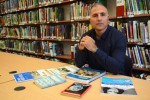Eyal Daniel (photo from Eyal Daniel)
Three Vancouver-area teachers who traveled to Israel last summer for an intensive three-week symposium on teaching about the Holocaust now plan to share their knowledge with other educators throughout the region.
The three were chosen to study at Yad Vashem, the Holocaust Martyrs’ and Heroes’ Remembrance Authority, with many of the world’s foremost scholars on the Shoah. The focus was on how to educate students of diverse cultures and faiths about the Holocaust and to leverage that knowledge as a framework for teaching about human values, responsible citizenship and social justice.
Eyal Daniel, former head of school at Vancouver Talmud Torah elementary and high school, the latter of which became King David High School, now teaches at Buckingham elementary in Burnaby. As a Jewish person and a native of Israel, Daniel said his experience was somewhat different from most of the other participants from across Canada, but he tried to go into the process ready to absorb everything presented.
“The symposium was three weeks, from 8:30 to 5:30 every day,” he said. “It included lectures about all the different facets connected to the Holocaust by really top lecturers.”
The group also visited different parts of Israel, including Kibbutz Lohamei Haghetaot, the Ghetto Fighters’ Kibbutz, formed by survivors of the Warsaw Ghetto. In addition to teachers, participants included Christian clergy, researchers and some people from the U.S. Holocaust Memorial Museum in Washington, D.C. The Canadian teachers were sponsored by the Canadian Society for Yad Vashem.
Among the most impactful aspects, said Daniel, was meeting and hearing from people with perspectives on well-known aspects of the Shoah.
“One of them was Anne Frank’s childhood friend, a woman at the age of 94, who knew her personally because she met her before [Frank] died in Bergen-Belsen concentration camp,” he said. “The second one was a couple that was on Schindler’s list, people that worked in Schindler’s factory and knew him personally.” Hearing firsthand accounts leaves a deep impact, he said. “You’re part of this history.”
He was also impressed to see how many non-Jewish people are touched and moved by the Holocaust and how committed they are to teach people from different cultures, he said.
The provincial education ministry curriculum does not require educators at any grade level to teach the Holocaust, although it usually comes up when studying the Second World War. It falls to the individual teacher to determine what to emphasize. Daniel has incorporated the topic into social studies, language arts and art. His students, for example, wrote poems about the Holocaust and Daniel sent the seven best to a competition for young writers by the Poetry Institute of Canada. All seven were published in an anthology.
He also incorporates books like The Boy in the Striped Pyjamas, The Old Brown Suitcase (by Vancouver writer Lillian Boraks-Nemetz) or Anne Frank’s diary, and films like the documentaries Paper Clips and Freedom Writers.
“The Holocaust is a one-time event, but it is also connected to racism and prejudice and stereotypes and genocide,” he said. The multicultural students of Metro Vancouver can often personally relate to the historical or contemporary manifestations of these topics.
“The idea is to show that, first of all, you need to learn about this kind of an event because even though it’s an exceptional event, it can happen – or may not happen – because of you,” he said.
Delta high school teacher Stephanie Henderson participated in the program, as well. She too tries to weave the topic into the curriculum when appropriate. When studying the history of Venice, for example, she will note the history of the Venice ghetto, the original Jewish ghetto but not the last.
“The Holocaust is getting to be far away,” she said. “Slowly, people are forgetting about it. This is giving us the ability to keep talking about it.”
The third local teacher on the program was Surrey high school teacher Mark Figueira. “Having been there, it’s something that I think about every day now, whereas before I had been to Israel, it was a topic that I covered in my class, but now it’s become much more than that,” he said. “When I teach about the Holocaust now, it’s so much more rich. It’s stories about people that we met. Just having been there gave me such a really good context for it now.”
The three have created a presentation they will share with other teachers during professional development days, beginning in Delta next February. They will offer advice and approaches on educating about the Holocaust for teachers at every level of knowledge and experience.
In the last decade, the Canadian Society for Yad Vashem has sent more than 200 teachers to attend the summer seminar, where they acquire pedagogical tools for teaching about the Holocaust to Canada’s multicultural students.

